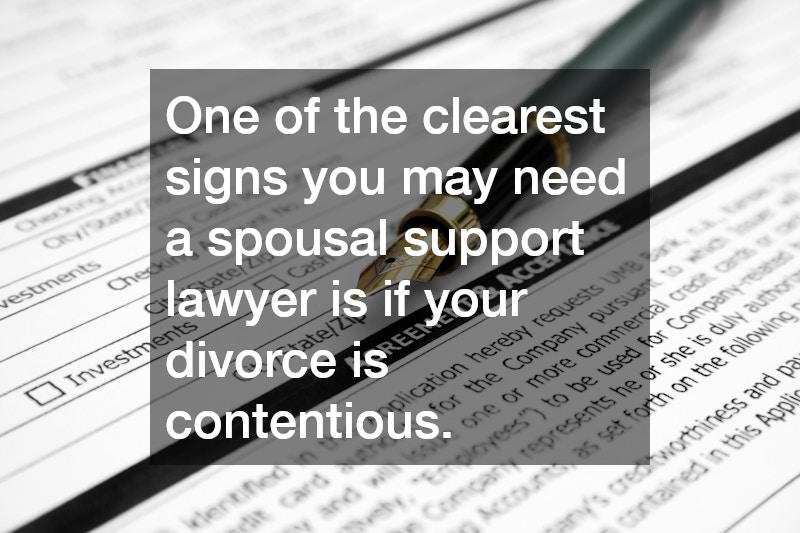Divorce or separation can be emotionally and financially challenging, and spousal support—or alimony—is often a complex aspect of these proceedings. While some couples can negotiate support amicably, others encounter disputes that require professional intervention. Understanding when to hire a spousal support lawyer can make the difference between securing fair financial arrangements and facing unnecessary hardship.
Spousal support is designed to ensure that one partner is not left financially vulnerable after a divorce. Factors such as the length of the marriage, each partner’s income, earning potential, and contributions to household management or child-rearing all influence the amount and duration of support.
Given the many variables and the legal framework involved, seeking guidance from a qualified attorney can safeguard your financial interests.
You Are Facing a High-Conflict Divorce
One of the clearest signs you may need a spousal support lawyer is if your divorce is contentious. High-conflict situations often arise when one party disputes financial obligations or refuses to negotiate fairly. In these circumstances, a lawyer can provide clarity on your rights, outline realistic expectations, and represent your interests in court if necessary. Legal expertise ensures that emotional tension doesn’t overshadow sound financial decision-making.
Your Financial Situation is Complex
Complex finances are another scenario where hiring a spousal support lawyer is crucial. If your income comes from multiple sources, such as business ventures, investments, or rental properties, calculating fair support can be difficult. Additionally, hidden or undisclosed assets can complicate the process. An attorney has the skills to conduct thorough financial investigations, interpret tax implications, and ensure that all relevant assets are considered when determining spousal support.
Negotiations Aren’t Progressing
Even in cases without significant conflict, negotiations can stall. If discussions regarding spousal support reach an impasse, professional guidance becomes essential. A spousal support lawyer can negotiate on your behalf, mediate disputes, and, if needed, petition the court for a resolution. Their experience with similar cases allows them to propose reasonable arrangements that satisfy legal standards while protecting your financial stability.
You Need to Modify Existing Support
Spousal support is not always a fixed obligation. Changes in circumstances—such as job loss, relocation, remarriage, or health issues—may necessitate modification. If you or your former spouse experience significant life changes, a spousal support lawyer can help petition the court to adjust payments appropriately. Attempting to navigate these modifications alone could result in delays or unfavorable outcomes, making professional advice invaluable.
You Lack Understanding of State Laws
Each state has unique laws regarding spousal support, including guidelines for calculation, duration, and eligibility. Without a thorough understanding of these laws, it’s easy to agree to terms that are unfair or unenforceable. A spousal support lawyer can explain your state-specific rights and obligations, ensuring that your agreements or court orders comply with legal standards.
Protecting Your Long-Term Financial Security
Spousal support often impacts your long-term financial well-being, influencing housing, retirement savings, and lifestyle. A lawyer can help structure agreements that address immediate needs and future stability. This includes drafting enforceable agreements, evaluating tax consequences, and securing payments in ways that protect you in case of non-compliance by your former spouse.
Avoiding Common Pitfalls
Hiring a spousal support lawyer also helps avoid common pitfalls. For instance, informal agreements without proper legal documentation can lead to disputes or difficulties enforcing support, leaving one party vulnerable to non-compliance or misunderstandings. Similarly, underestimating income potential, overlooking future earnings, or failing to disclose assets can result in arrangements that are unfair or unsustainable over time. A skilled attorney ensures all aspects of the support process are transparent, equitable, and legally sound, carefully reviewing financial records, employment history, and property ownership. They can also anticipate changes in circumstances, such as career shifts, relocation, or health issues, and structure agreements to accommodate these possibilities. Additionally, a lawyer can guide negotiations, mediate conflicts, and represent clients in court if disputes arise, helping prevent costly litigation or prolonged stress. Ultimately, securing professional legal guidance provides peace of mind, ensuring that spousal support agreements are fair, enforceable, and aligned with both parties’ long-term interests.
Emotional Support and Guidance
Divorce is inherently stressful, and the financial dimension often adds pressure. Working with a lawyer not only provides technical guidance but also offers reassurance and a clear roadmap through complex decisions. Knowing that your interests are professionally represented allows you to focus on personal well-being while legal matters are handled efficiently.
Recognizing when to hire a spousal support lawyer is vital for ensuring fair financial arrangements and protecting your long-term security. Whether your divorce is high-conflict, involves complex finances, requires modification of existing support, or simply leaves you uncertain about your legal rights, professional guidance can make a substantial difference. Beyond negotiations and court representation, a lawyer provides clarity, reduces stress, and helps prevent common mistakes that could have lasting consequences. By engaging a qualified attorney at the right time, you safeguard not only your finances but also your peace of mind, enabling a smoother transition into post-divorce life.

